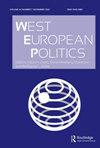Divided by Europe: affective polarisation in the context of European elections
IF 3.6
1区 社会学
Q1 POLITICAL SCIENCE
引用次数: 2
Abstract
Abstract As European integration has become politicised over the last several decades, scholars have paid keen attention to the role of identity in shaping political conflicts and contestation in Europe. This article investigates the microfoundation of the political divide over European integration by building on and extending theories of social identity and recent studies on affective polarisation. Large-scale survey experiment data from 25 European Union member states are analysed to explore the extent of divides over European integration. This analysis shows a statistically significant and substantively large magnitude of the divide based on European identity. Moreover, results show that this divide over European integration deserves particular attention as it is largely driven by out-group animosity, rather than in-group favouritism. Lastly, results show that electoral context, such as electoral salience, involvement in elections, elite polarisation, and the strength of Eurosceptic parties, influences the intensity of the European divide.欧洲分裂:欧洲选举背景下的情感两极分化
摘要随着欧洲一体化在过去几十年中变得政治化,学者们密切关注身份在塑造欧洲政治冲突和争论中的作用。本文通过建立和扩展社会认同理论以及最近关于情感两极分化的研究,探讨了欧洲一体化政治分歧的微观基础。分析了来自25个欧盟成员国的大规模调查实验数据,以探讨欧洲一体化问题上的分歧程度。这项分析显示,基于欧洲身份的差异在统计上具有显著性,而且幅度很大。此外,研究结果表明,这种在欧洲一体化问题上的分歧值得特别关注,因为它在很大程度上是由集团外的敌意而非集团内的偏袒所驱动的。最后,结果表明,选举背景,如选举突出性、参与选举、精英两极分化和疑欧派政党的实力,会影响欧洲分歧的强度。
本文章由计算机程序翻译,如有差异,请以英文原文为准。
求助全文
约1分钟内获得全文
求助全文
来源期刊

West European Politics
POLITICAL SCIENCE-
CiteScore
10.00
自引率
7.10%
发文量
58
期刊介绍:
West European Politics (WEP)has established itself as one of the most authoritative journals covering political and social issues in Western Europe. It has a substantial reviews section and coverage of all national elections in Western Europe. Its comprehensive scope, embracing all the major political and social developments in all West European countries, including the European Union, makes it essential reading for both political practitioners and academics.
 求助内容:
求助内容: 应助结果提醒方式:
应助结果提醒方式:


